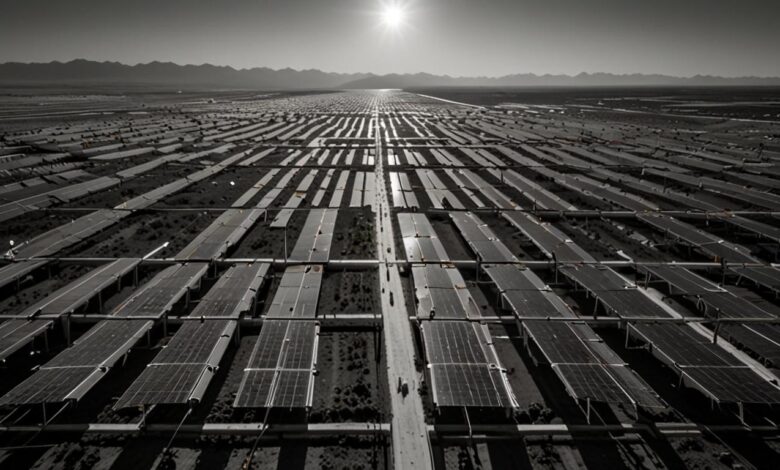Surge in U.S. Solar Power, Wind Projects Languish

Recent years have witnessed a remarkable increase in solar power projects in the United States, propelled by the Inflation Reduction Act of 2022, while wind power projects face various challenges leading to stagnation. In contrast, China continues to dominate the global renewable energy sector with the inauguration of the world’s largest solar farm in Xinjiang, highlighting its significant contributions towards renewable energy expansion.
Surge in U.S. Solar Power, Wind Projects Languish
June 3, 2024
Recent Developments in U.S. Renewable Energy:
Solar power projects have gained significant momentum in the United States in recent years, surpassing expectations in capacity additions. This growth follows the passage of the Inflation Reduction Act in 2022. However, wind power projects have seen a slowdown. Factors contributing to wind power’s stagnation include supply chain disruptions, logistical challenges such as lack of transmission lines, lengthy permitting processes, and community opposition.
Key Statistics:
– Since the Inflation Reduction Act, annual solar power capacity additions have reached record highs.
– Wind power capacity additions have not maintained their previous pace.
Challenges for Wind Power:
Wind power is highly location-dependent, with ideal spots being limited and often already utilized. Additional hurdles include the difficulty in obtaining permits for new transmission lines and opposition from local communities. Supply chain issues post-pandemic have further exacerbated the situation, with costs for wind equipment soaring and offshore wind projects in the Northeast facing cancellations.
Comparison With China:
Meanwhile, China continues to lead globally in renewable energy adoption. A new 5GW solar plant in Xinjiang, covering 200,000 acres, was recently connected to the grid. This plant alone can power a small country like Luxembourg. China’s aggressive renewable strategy has led to a 50% increase in solar capacity in 2023, with expectations that the country will install over half of the new global renewable capacity by 2030.
Outlook:
While solar power in the U.S. is on track to meet ambitious targets, the wind power sector faces significant challenges. Efforts are underway in some states to ease restrictions on renewable energy projects and accelerate transmission line projects. However, it remains uncertain if wind power can catch up to expectations soon.
The continued struggle in the wind sector raises doubts about the feasibility of current plans to drastically cut U.S. greenhouse gas emissions by 2030, which were initially based on a balanced expansion of both solar and wind power capacities.
World’s Largest Solar Farm Online in China
June 4, 2024
Overview:
China has recently brought the world’s largest solar farm online in the northwestern province of Xinjiang. The facility, spanning 200,000 acres and capable of generating over 6 billion kilowatt hours annually, can power a country the size of Luxembourg or Papua New Guinea. This new development underscores China’s leadership in renewable energy, having increased its solar capacity by more than 50% in 2023.
Importance:
China’s rapid expansion in renewable energy capacity is crucial in global efforts to triple renewables by 2028. The International Energy Agency (IEA) projects that nearly 60% of the new global renewable capacity by then will come from China.
Impact on Trade:
The surge in solar panel production in China has raised concerns about overcapacity and potential trade tensions. In response, U.S. President Joe Biden has increased tariffs on Chinese solar cell imports from 25% to 50% to manage market impacts.
China’s renewable energy growth is seen as vital for global climate goals, potentially enabling significant reductions in greenhouse gas emissions.
By providing these details, readers can better understand the current dynamics in the renewable energy sector, particularly the contrasting developments between solar and wind power in the U.S. and China’s ambitious renewable energy initiatives.








